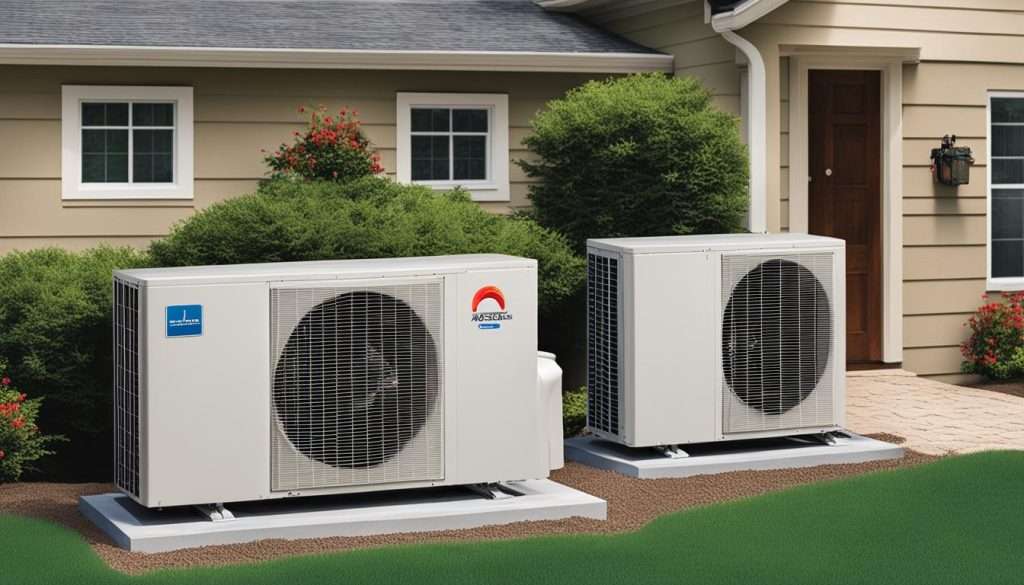When it comes to cooling and heating your home, you may have heard the terms HVAC and AC being used interchangeably. But are they really the same? Understanding the difference between HVAC and AC is essential for making informed decisions about your home’s climate control needs.
HVAC stands for heating, ventilation, and air conditioning, while AC specifically refers to air conditioning. HVAC systems are comprehensive solutions that encompass heating, cooling, ventilation, and ductwork. They provide complete climate control for homes, ensuring comfort throughout the year.
On the other hand, AC units focus solely on cooling the air in your home. They can come in the form of window units or be integrated into a central AC system. AC is a vital component of HVAC systems, but HVAC goes beyond just cooling to include heating and ventilation as well.
Key Takeaways:
- HVAC stands for heating, ventilation, and air conditioning, while AC refers specifically to air conditioning.
- HVAC systems provide comprehensive climate control solutions, including heating, cooling, ventilation, and ductwork.
- AC units focus solely on cooling the air in your home and can be standalone or part of an integrated HVAC system.
- Understanding the differences between HVAC and AC is essential for choosing the right system for your home.
- HVAC offers a more inclusive solution, considering temperature control, humidity levels, and ventilation.
Understanding HVAC Systems
HVAC systems are comprehensive heating, ventilation, and air conditioning systems that provide both heating and cooling solutions for homes. These systems are designed to regulate temperature, control humidity, and ensure proper ventilation, offering a complete climate control solution for indoor spaces.
HVAC systems typically include a combination of different components, such as:
- Furnace: A furnace is responsible for generating heat and is an essential part of the heating aspect of HVAC systems. It can use various fuel sources, including gas, oil, or electricity, to warm the air.
- Air Conditioner: An air conditioner is responsible for cooling the air within the indoor space. It removes heat from the air and circulates it back into the environment.
- Ducts: Ducts are used to distribute the heated or cooled air throughout the home. They act as pathways, allowing the air to flow from the HVAC system to different rooms.
- Vents: Vents are openings in the walls, floors, or ceilings where conditioned air can enter and exit the rooms.
- Filters: Filters help purify and clean the air by trapping dust, allergens, and other particles. Regularly changing or cleaning these filters is essential for maintaining optimal indoor air quality.
When functioning properly, HVAC systems create a comfortable environment by adjusting the temperature, removing excess moisture, and supplying fresh air from outside. These systems are suitable for various types of buildings, including residential homes, commercial spaces, and industrial complexes.
Having a well-designed HVAC system is crucial for creating a comfortable and healthy indoor environment. Whether it’s cold or hot outside, HVAC systems ensure that you can enjoy the ideal temperature, proper ventilation, and clean air inside your home.
Types of AC Units
AC units are an integral part of HVAC systems, providing cooling solutions for your home. Understanding the different types of AC units available can help you choose the right one for your specific needs. Let’s take a closer look at three common types of AC units:
1. Window Units
Window units are compact AC systems designed to cool individual rooms. These units are installed directly in a window or a specially designed hole in a wall. Window units are highly versatile and easy to install. They offer a cost-effective cooling solution for small spaces, such as bedrooms or offices.
2. Central Units
Central AC units are larger and more powerful than window units. They are typically integrated into HVAC systems and provide cooling for the entire house. Central units distribute cool air through a network of ducts and vents, effectively regulating the temperature in every room. These units offer enhanced comfort and are best suited for larger residential or commercial spaces.
3. Mini-Splits
Mini-split AC units are versatile systems that can function as standalone units or be part of an HVAC setup. These units consist of an outdoor compressor and an indoor air handling unit. Mini-splits are a popular choice for homes without ductwork, as they provide both cooling and optional heating capabilities. They offer flexibility in terms of installation and zoning, allowing you to control the temperature of individual rooms.
When selecting an AC unit, consider factors such as the size of the space you want to cool, energy efficiency ratings, and budgetary constraints. Consulting with a professional HVAC technician can help you determine the best AC unit for your specific requirements.
The Role of Heat Pumps
Heat pumps play a crucial role in HVAC systems, offering both heating and cooling capabilities. These versatile units can be found in homes across the country, providing comfort throughout the year. Let’s take a closer look at how heat pumps work and their significance in HVAC systems.
Heat pumps come in two main types: split units and packaged units. Split units have an indoor evaporator coil and an outdoor unit that contains the compressor and condenser. Packaged units, on the other hand, have all the components housed in a single outdoor unit. This flexibility allows heat pumps to cater to various climate needs and home setups.
Heat pumps are designed to extract heat from the air or ground and transfer it to the interior of your home during colder months. This process is reversed during warmer months, as the pump extracts heat from indoors and releases it outside, effectively cooling your living spaces. By utilizing an efficient refrigeration cycle, heat pumps are capable of maintaining a comfortable temperature regardless of the exterior conditions.
One of the key advantages of heat pumps is their energy efficiency. Unlike traditional heating systems that generate heat, heat pumps only use electricity to move heat from one location to another. This makes them a cost-effective solution for both heating and cooling needs. Additionally, heat pumps also provide dehumidification benefits, helping to control indoor humidity levels.
Overall, heat pumps are an integral component of HVAC systems, offering a comprehensive heating and cooling solution. Whether you live in a warm or cold climate, heat pumps can help maintain a comfortable temperature in your home year-round. Their energy-efficient operation and ability to provide both heating and cooling make them an excellent choice for homeowners seeking versatility and cost savings.
Stay tuned for the next section, where we’ll explore the importance of furnaces in HVAC systems.
The Importance of Furnaces in HVAC Systems
When it comes to HVAC systems, furnaces play a crucial role in providing efficient heating solutions. Unlike air conditioning (AC), which focuses solely on cooling, HVAC systems are designed to regulate both hot and cold air, making them ideal for maintaining comfortable indoor temperatures throughout the year.
Furnaces are a common component of many HVAC systems and are often powered by natural gas. These units burn fuel to generate heat, allowing them to warm up the air circulated throughout the home. Furnaces are typically installed in basements or crawl spaces and work in conjunction with air conditioning units to offer comprehensive climate control.
In colder climates, where additional heating is necessary, furnaces are especially important. They provide consistent and reliable warmth, ensuring that you stay comfortable even in the coldest months. The combination of a furnace and an air conditioning unit in an HVAC system offers homeowners the flexibility to adjust and maintain their indoor climate all year round.
By incorporating a furnace into an HVAC system, you can seamlessly transition between heating and cooling modes while benefiting from the system’s overall efficiency. The integration of multiple components, including the furnace, air conditioner, ducts, and vents, allows HVAC systems to deliver a complete climate control solution for your home.
Benefits of Furnaces in HVAC Systems:
- Efficient heating solution for colder climates
- Consistent and reliable warmth throughout the year
- Allows seamless transition between heating and cooling modes
- Part of a comprehensive HVAC system for complete climate control
With a furnace as an integral part of your HVAC system, you can enjoy the comfort and convenience of a well-regulated indoor environment. Whether it’s keeping warm during the winter or staying cool in the summer, HVAC systems provide the versatility and reliability you need to create a comfortable living space.
Key Differences between HVAC and AC
When it comes to keeping your indoor environment comfortable, understanding the differences between HVAC and AC is crucial. HVAC and AC are often used interchangeably, but they refer to distinct systems that serve different purposes. Let’s dive into the key differences between HVAC and AC to help you make informed decisions for your home.
HVAC: Heating, Ventilation, and Air Conditioning
HVAC stands for heating, ventilation, and air conditioning. It is a comprehensive system that encompasses heating, cooling, and ventilation. HVAC systems are designed to regulate temperature, control humidity levels, and provide proper airflow throughout an indoor space.
Unlike AC, which serves only the cooling function, HVAC includes heating components such as furnaces or heat pumps. This means that an HVAC system can provide both heating and cooling capabilities, ensuring year-round comfort.
AC: Air Conditioning
AC, on the other hand, refers specifically to the cooling component of an HVAC system. AC units focus solely on cooling the air and do not include heating or ventilation functions. They are responsible for extracting heat from indoors and releasing it outside, keeping the indoor environment cool and comfortable during hot weather.
AC units can come in various forms, including window units and central AC systems. Window units are typically used to cool individual rooms, while central AC systems are integrated into the HVAC system and can cool an entire house.
Comprehensive Solution vs. Cooling-only Function
The main difference between HVAC and AC lies in the scope of their functions. HVAC offers a comprehensive solution for temperature control, humidity regulation, and proper ventilation. It not only cools the air but also heats it when needed, ensuring a comfortable environment year-round.
On the other hand, AC units focus solely on cooling the air, making them ideal for warm climates or during hot summer months. They provide effective cooling solutions but do not have the capability to regulate humidity or provide heating functions.
Ultimately, the choice between HVAC and AC depends on your specific needs and preferences. If you require both heating and cooling capabilities, along with proper ventilation, an HVAC system is the way to go. However, if you live in a warmer climate and only need cooling solutions, AC units can be a more cost-effective choice.
Regardless of your choice, it’s essential to consider factors such as energy efficiency, maintenance requirements, and installation costs when selecting the right system for your home.
What You Need to Know about HVAC and AC
Understanding the difference between HVAC and AC is essential when it comes to choosing the right system for your home.
HVAC (heating, ventilation, and air conditioning) systems provide a complete climate control solution, including both heating and cooling, as well as ventilation and ductwork. These systems are designed to regulate temperature, control humidity, and ensure proper airflow throughout your home. With HVAC, you get a comprehensive solution for maintaining a comfortable indoor environment in all seasons.
AC (air conditioning), on the other hand, focuses solely on cooling the air in your home. AC units can be standalone devices, such as window-mounted AC units, or part of an integrated HVAC system. They work by removing heat from the indoor air and delivering cool air to create a comfortable living space, especially during hot summer months.
By understanding the distinctions between HVAC and AC, you can make informed decisions about your home’s heating and cooling needs. Whether you opt for a complete HVAC system or a standalone AC unit, it’s crucial to consider factors like your climate, budget, energy efficiency, and overall comfort requirements to make the right choice for your specific needs.
To further illustrate the differences between HVAC and AC, take a look at this image:

Key differences between HVAC and AC:
- HVAC encompasses heating, ventilation, and air conditioning, while AC focuses solely on cooling.
- HVAC systems provide complete climate control, including heating, cooling, and ventilation, while AC units only cool the air in your home.
- HVAC systems require additional components like ductwork, thermostats, and filters, while AC units can be standalone or integrated into an HVAC system.
- With HVAC, you have the flexibility to control temperature, humidity levels, and airflow, ensuring a comfortable environment year-round.
Now that you have a better understanding of HVAC and AC, you can confidently choose the system that aligns with your home’s needs and your desired level of comfort. Keep in mind that consulting with a professional HVAC technician is always recommended to assess your specific requirements and ensure proper installation and maintenance.
Conclusion
In conclusion, HVAC systems and AC units serve different purposes when it comes to providing comfort in your home. HVAC, which stands for heating, ventilation, and air conditioning, encompasses a comprehensive system that offers heating, cooling, and ventilation capabilities. On the other hand, AC refers specifically to air conditioning and focuses solely on cooling.
While AC units are designed to cool the air in your home, HVAC systems go beyond just cooling. They also regulate temperature, control humidity levels, and ensure proper ventilation, creating a more comfortable indoor environment. HVAC systems provide a complete solution for all seasons, allowing you to maintain a desirable temperature throughout the year.
Understanding the differences between HVAC and AC is crucial in selecting the right system for your specific needs. If you live in a region with extreme weather conditions, an HVAC system can provide the versatility of both heating and cooling. However, if cooling is your primary concern, an AC unit may be more suitable. Consider factors such as climate, budget, and overall home comfort requirements when making your decision.
If you need an HVAC or AC repair in the South Jersey area contact our HVAC experts at D’Auria & Son
FAQ
Is HVAC just AC?
No, HVAC stands for heating, ventilation, and air conditioning, while AC specifically refers to air conditioning. HVAC systems encompass both heating and cooling solutions, including heat pumps, gas furnaces, and air conditioning units. AC is used to cool the air in your home and can be in the form of window units or central AC. HVAC systems also cover ventilation and ductwork.
What is the difference between HVAC and AC?
HVAC refers to a complete system that includes heating, ventilation, and air conditioning, while AC specifically deals with the cooling component. HVAC systems provide both heating and cooling capabilities, while AC units focus solely on cooling. HVAC systems offer a more comprehensive solution for maintaining a comfortable indoor environment, considering temperature control, humidity levels, and ventilation.
What are HVAC systems?
HVAC systems are comprehensive heating, ventilation, and air conditioning systems that provide both heating and cooling solutions for homes. These systems typically include a furnace, air conditioner, ducts, vents, and filters. HVAC systems are designed to regulate temperature, control humidity, and ensure proper ventilation, offering a complete climate control solution for indoor spaces.
What are the types of AC units?
There are different types of AC units available, including window units, central units, and mini-splits. Window units are small air conditioners suitable for cooling individual rooms. Central units are larger and integrated into HVAC systems, providing cooling for an entire house. Mini-splits can function as standalone AC units or include a heating component, making them suitable for homes without ductwork.
What is the role of heat pumps in HVAC systems?
Heat pumps are a common part of HVAC systems and perform both heating and cooling functions. They can be either split units, with the evaporator coil inside the house and the rest of the unit outside, or packaged units, which are kept outdoors. Heat pumps are a versatile solution for maintaining a comfortable temperature throughout the year in both warm and cold climates.
How important are furnaces in HVAC systems?
Many HVAC systems utilize natural gas furnaces for heating. Furnaces burn fuel to generate heat and are usually installed in basements or crawl spaces. They are more common in colder climates, where additional heating is necessary. Furnaces, when combined with air conditioning units, provide comprehensive heating and cooling solutions as part of an HVAC system.
What do I need to know about HVAC and AC?
Understanding the difference between HVAC and AC is essential when it comes to choosing the right system for your home. HVAC systems provide a complete climate control solution, including both heating and cooling, as well as ventilation and ductwork. AC units focus solely on cooling the air in your home and can be standalone units or part of an integrated HVAC system. Knowing the distinctions between HVAC and AC can help you make informed decisions about your home’s heating and cooling needs.





